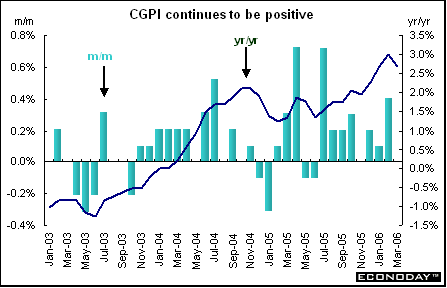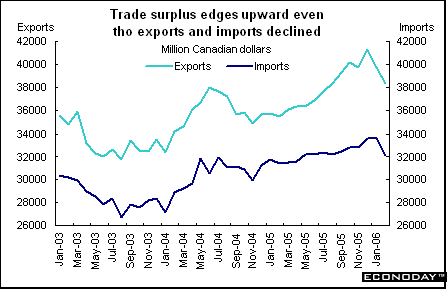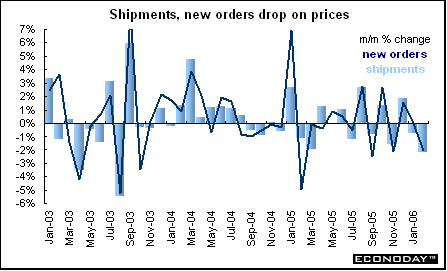Stocks retreated across the board last week for a laundry list of reasons. After the recent run up in equity prices, it's no surprise that investors would indulge in profit taking prior to the onslaught of earnings reports over the next several weeks. And then there are political tensions in Iran, Iraq and Nigeria that are driving up energy prices. As crude toys with the $70 per barrel level, investors are concerned about a hit to profits and to consumer spending. Most of last week's international economic data concerned merchandise trade balances. Canada's surplus was larger but in the U.S., the UK, and in reporting EMU countries deficits burgeoned as energy imports taxed balances. In the four days of trading, only the FTSE and Kospi managed to barely eke out a gain. In North America, the Dow and S&P/TSX composite were up, while the Nasdaq and Bolsa were down for the week.

Global Stock Market Recap

Europe and the UK
Trading in London, Frankfurt and Paris was choppy with the DAX and CAC ultimately losing ground. The DAX faltered when financial companies including Deutsche Bank declined amid increasing concerns that interest rates are on the way up. In an interview, European Central Bank council member Klaus Liebscher signaled that interest rates might have to rise in June to curb inflation. The two indexes were also depressed by the possible impact of high commodity prices on profits and spending and by a disappointing ZEW sentiment index reading in Germany.

The FTSE bounced to the tune of profit taking in the mining sector which was in turn a reflection of ever-higher commodity prices. Stock exchange mergers were back on the agenda after Nasdaq announced late on Tuesday it had acquired a 14.99 percent stake in the London Stock Exchange, after having withdrawn its bid for the LSE only last month.
Asia/Pacific
Most Asian/Pacific equities were down as investors sought to take profits after the rapid run up in prices and prior to earnings announcements. On the week (ending Thursday) only the Kospi managed to edge higher - and only by 0.2 percent. The biggest losers were the two Japanese indexes. The Nikkei lost 2.1 percent while the Topix was down 2.2 percent.

Foreign investors doubled their net buying of Japanese shares in March thanks to greater confidence in the economy. Net buying jumped to a four-month high of ¥1,487 billion, after hitting an eight-month low of ¥684 billion in February. Foreign buyers were the driving force behind last year's strong rally in Japanese stocks, which pushed the Topix up as much as 44 percent. Overseas interest brought the Topix to a 14-year high in the week ended April 7th although the index has since retreated. But with valuations at high levels, overseas investors appear to be waiting for further evidence of corporate earnings growth from the annual results season, which starts later this month.
Bank of Japan keeps the status quo
The Bank of Japan kept its interest rate close to zero and said it was awaiting more evidence that the economy could withstand a rate increase for the first time since 2000. At the previous meeting, the nine member Monetary Policy Committee headed by Governor Toshihiko Fukui signaled an end to the bank's deflation-fighting policy. The Bank ended a policy of pumping cash into the banking system by cutting the amount of reserves it makes available to about ¥6 trillion from ¥30 trillion over the next several months. An interest rate change in Japan would mark the first round of synchronized increases in major economies for six years. The Federal Reserve and European Central Bank are both tightening credit. The Japanese central bank last increased its target for the benchmark overnight lending rate between banks in August 2000 from near zero. It lowered the rate less than seven months later as the economy fell into recession. The next meeting is on April 28th when the Bank will release its semi-annual economic outlook.
Currencies
The yen continues to be vulnerable to interest rate expectations. On Tuesday, it was down against the dollar, euro and others after BoJ Governor Fukui said there is no set timetable for raising interest rates. The BoJ continues to drain excess cash from the banking system which is seen as a precursor to any interest rate move. Among the most affected by any interest rate move in Japan would be the carry trade speculators - that is, those who borrow in a low interest rate country and invest in a high interest rate country to benefit from the spread. The dollar gained against the yen because traders are all but certain that the Federal Reserve will continue increasing U.S. interest rates - the fed funds rate is now 4.75 percent. This helped offset the normally downward pressure on the dollar given the huge trade deficit.

In Europe, the euro strengthened on rhetoric that the European Central Bank could lift its interest rate again as soon as their June meeting. The euro was down after the ECB's April 6th meeting when ECB President Jean-Claude Trichet dashed expectations for a rate increase in May.
Indicator scoreboard
EMU - Fourth quarter real, seasonally adjusted gross domestic product was up 0.3 percent and 1.8 percent when compared with the same quarter a year ago. Consumption expenditure was up a revised 0.1 percent from the previous estimated 0.2 percent decline. Capital formation was revised downward to an increase of 0.3 percent from the previous estimate of a 0.8 percent gain.

Germany - April ZEW sentiment survey reading declined to 62.7 from March's 63.4. ZEW said that high oil prices and the risk of a global slowdown weighed on the results. The current conditions index climbed to 2.9 from March's minus 8.4 thanks to a flourishing export trade and a good performance of German industry in general. The Mannheim-based Center for European Economic Research (ZEW) surveyed 316 German financial experts for their opinions on current economic conditions and the economic outlook for major industrial economies between March 17th and April 10th.

France - February seasonally adjusted industrial output decline 0.9 percent and was down 0.3 percent when compared with February a year ago. Manufacturing output was down 1.1 percent and edged down 0.1 percent on the year. Auto output dropped 3.9 percent after jumping 5 percent in January. Similarly, capital goods output was down 1.3 percent after increasing by 0.4 percent in the previous month.

February merchandise trade deficit was €2.0 billion, somewhat lower than January's deficit of €2.4 billion. Imports declined 1.6 percent after increasing 1.1 percent in January. Imports of energy, consumer and capital goods were down. Exports declined 0.5 percent after increasing by 1.9 percent in the prior month.

Italy - February industrial output was up 0.8 percent and 3.1 percent when compared with last year. All output sectors were up with the exception of energy. Consumer goods were up 1.8 percent while capital goods gained 3.6 percent. Energy declined 2.5 percent.

February merchandise trade deficit was €2.96 billion, an improvement over January's deficit of €4.1 billion. Exports were down 0.8 percent while imports were up 0.9 percent mostly on energy imports. When compared with February 2005, exports were up 14.4 percent while imports soared by 20.5 percent thanks to energy imports that were up 59.7 percent on the year. Excluding energy, the trade balance would have registered a surplus of €1.6 billion.

Britain - February merchandise trade deficit widened to Stg4.814 billion in February from Stg4.576 billion in the previous month. Goods deficit narrowed slightly to Stg6.478 billion from a record Stg6.538 billion in January. The non-EU goods trade deficit narrowed to Stg3.356 billion from Stg3.703 while the deficit with EU countries rose to Stg3.122 billion from Stg2.835 billion. The services surplus narrowed to Stg1.664 billion from Stg1.962 billion. Excluding oil and erratic items, the global goods trade deficit widened to Stg6.338 billion from Stg5.735 billion in January, the largest since records began.

March producer output prices were up 0.3 percent and 2.5 percent when compared with last year. Core output prices which exclude food, tobacco, petroleum and beverage prices were up 0.3 percent and 1.9 percent on the year. Input prices were up 0.3 percent and 13.1 percent on the year. Crude oil prices were up 1.8 percent and were up 29.4 percent on the year.

March claimant count unemployment jumped by 12,600 after climbing 19,000 in February. This pushed the claimant count unemployment rate to 3 percent from 2.9 percent previously. The International Labour Organisation measure of unemployment for the three months to February was up by 20,000, pushing the ILO unemployment rate to 5.1 percent from 5.0 percent for the previous three months to January.

Average earnings for the three months to February were up 4.2 percent mainly due to higher bonus payments in the financial sector. Private sector earnings, which include the financial sector, were up 4 percent from 3 percent in January. Excluding bonuses, earnings growth remained at 3.8 percent on the year.

Asia
Japan - March corporate goods price index was unchanged and up 2.7 percent when compared with last year. Prices for nonferrous metals and petroleum & coal products were up while chemicals & related products were down.

Americas
Canada - February merchandise trade surplus climbed to C$6.3 billion from C$6.2 billion in the previous month. Both imports and exports declined. Imports were down 4.6 percent with the largest declines occurring in industrial goods and machinery which includes metals and chemicals. Exports were down 3.5 percent with the largest drop occurring for passenger vehicles, down 12.7 percent because of production slowdowns and softer U.S. demand. The trade surplus with the U.S. declined to C$9.4 billion from C$10.5 billion in January. Canada incurred deficits with all other countries.

February factory shipments plummeted 2.2 percent and were down 0.4 percent when compared with last year. The drop was attributed to lower prices for petroleum, wood and chemical prices. Sixteen of the 21 industries accounting for 64 percent of manufacturing posted decreases. A portion of the drop was concentrated in industries where prices have fallen in recent months. Excluding the petroleum and coal products, wood products and chemical products industries, shipments declined only 0.8 percent. Unfilled orders were up 1 percent and 12.5 percent on the year with sizable gains reported for fabricated metal products, railroad rolling stock and the heavy duty truck industries. However, new orders sank by 2.1 percent but were up 0.6 percent on the year. The aerospace and primary metals industries were largely responsible for the decline.

Bottom line
This is a light week when it comes to new economic data. And as the earnings season shifts into high gear, investors will be looking at earnings and any possible impact that high energy prices might be having.

